Service management is the hidden engine behind every successful business, keeping operations running smoothly while supporting both employees and customers. But as service demands grow in volume and complexity, traditional approaches just can’t keep up.
Artificial intelligence is the solution. AI enables service teams to resolve issues faster by handling routine tasks and equipping them with the tools to make better, quicker decisions. This article explores how AI service management works across various business functions and introduces monday service as a platform to scale service delivery across your entire organization.
Try monday serviceWhat is AI service management?
AI service management (AISM) is the use of artificial intelligence to improve how businesses manage all the different types of services they deliver and support. Teams can use AISM to automate routine tasks and gain insights to address any issues effectively.
Unlike traditional service management, which relies on rigid processes, AISM adapts to your business’s unique needs. It continuously learns from your team’s data to shape relevant and accurate decision-making.
How does AI in service management actually work?
AI service management combines several technologies to make service delivery faster, smarter, and more adaptive. Each of the following building blocks plays a specific role in AISM.
Machine learning (ML) algorithms
Machine learning allows AI to learn from data sets and improve its decisions over time. In service management, it recognizes patterns in past tickets to classify and route new ones more accurately. Two options make it easier to direct requests to the right place without relying on manual triage.
- Supervised learning: AI is trained on examples that already have known outcomes, like labeled tickets or resolved cases, so it knows how to handle similar requests in the future.
- Unsupervised learning: The system scouts for patterns or clusters in the data without any labels to spot emerging issues or unusual trends that aren’t yet clear.
Natural language processing (NLP)
NLP enables AI to understand and work with human language — the kind of free-text input that users submit in tickets, emails, or chats. It supports capabilities like:
- Sentiment analysis: Understanding the tone or urgency behind a message
- Intent detection: Identifying what the user is trying to do (for example, reset a password, report a bug, or request access)
- Entity recognition: Picking out important details like names, dates, or product IDs to pre-fill fields or match requests to records
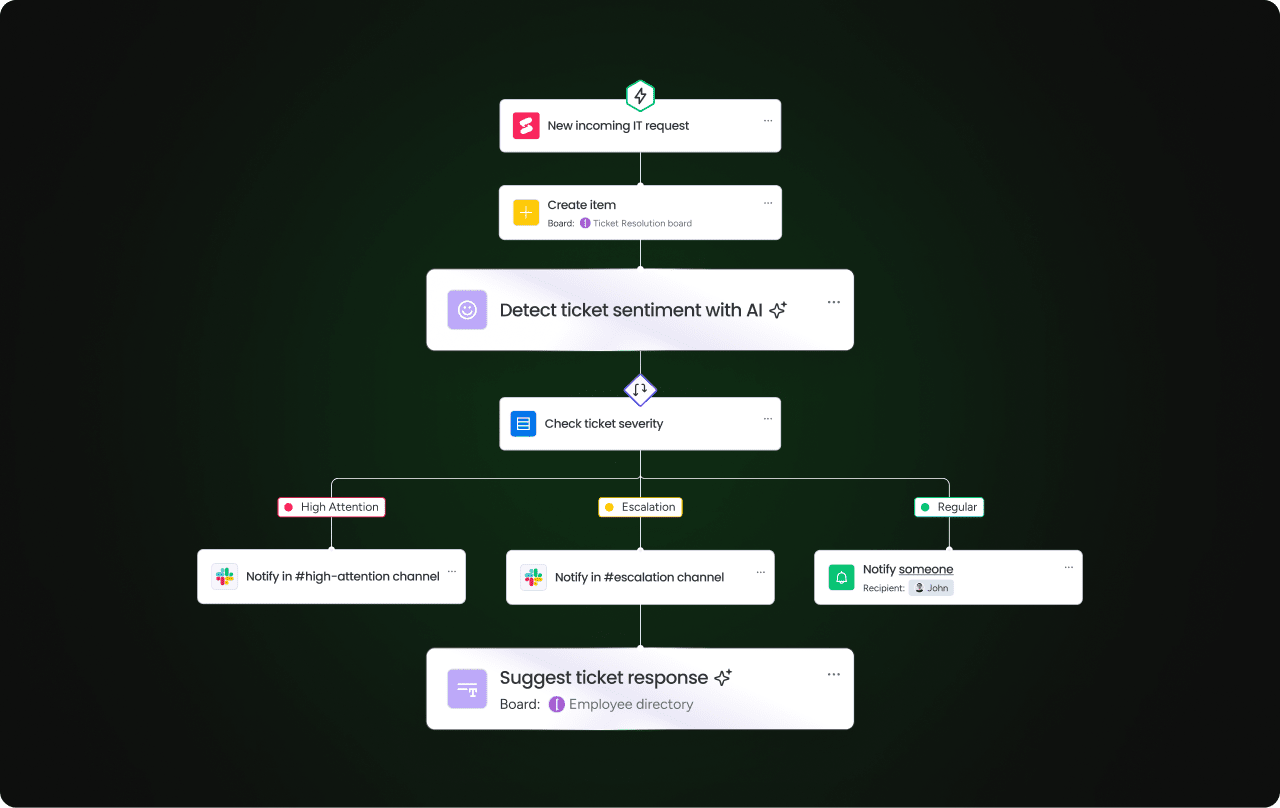
Generative AI
Generative AI creates human-like content in response to service requests. It’s what powers dynamic replies in chatbots or ticket summaries written in natural language.
Large language models (LLMs) like GPT are at the core of this content; they’ve been trained on massive datasets to understand and create text. In service management, teams might use generative AI to produce a natural, helpful tone when they draft conversation replies or summarize long ticket threads.
Predictive analytics
Predictive analytics enables teams to make informed decisions before issues arise. In service management, it uses the following to produce a high quality of service:
- Historical data analysis: AI scans past service data, such as ticket volumes, request types, and resolution times to identify recurring patterns. Service teams can understand where problems often occur and what normal demand should look like over time.
- Statistical modeling and forecasting: Trend analysis and probability models predict future outcomes, such as a rise in access requests after a policy change or a drop in resolution speed during peak periods. Both are integral to better resource planning and SLA management.
Automation and workflow integration
AI is even more effective when it’s connected to the tools your business already relies on. Through integrations with platforms like customer relationship management platforms, HR systems, and IT service management tools, AI can move requests forward without waiting for manual input.
That might mean updating a ticket’s status when a task is complete, sending a message to a service specialist, or kickstarting an approval flow behind the scenes. These small actions keep work flowing smoothly so teams can be available for more pressing tasks.
AI Blocks
Discover how to automate smarter, work faster, and make better decisions using monday AI Blocks, with a short lesson in monday academy. Learn how to use monday’s AI Blocks.
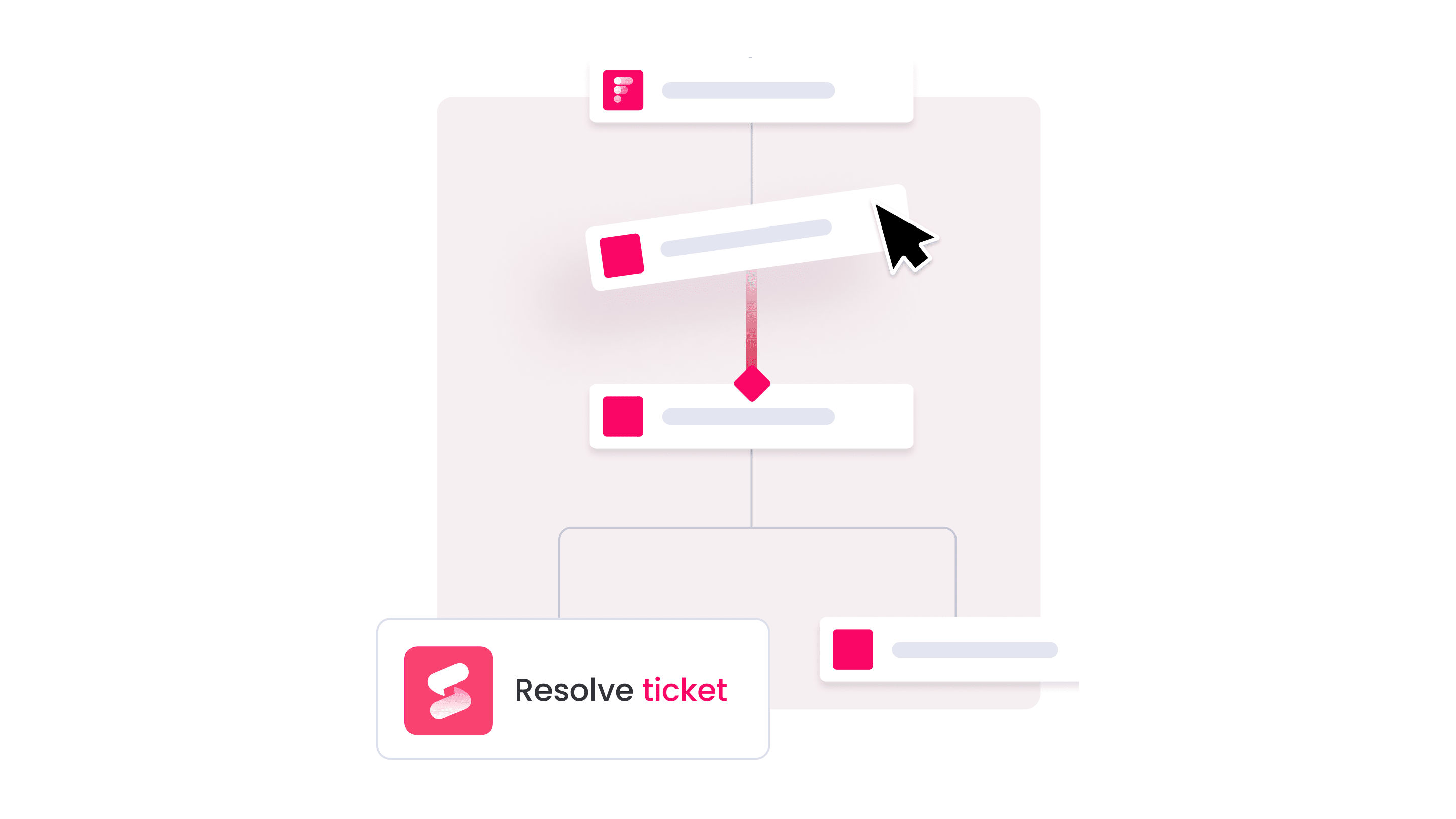
What are the benefits of AI service management for business?
AI promises to help teams work smarter, respond quicker, and deliver more value with less effort. But what do these mighty claims look like in action? Here are the benefits modern service teams can expect from an investment in AISM.
Efficiency gains
AI service management eliminates slow, repetitive tasks — the mundane work that eats into your time and prevents you from tackling more valuable tasks. By doing so, service teams use AI to handle requests faster, with fewer handoffs and less overhead.
At Goldman Sachs, this kind of shift is already happening. CEO David Solomon recently shared that AI now completes 95% of an S1 IPO filing in just a few minutes — a job that previously took two full weeks for a six-person team. It’s a clear example of how AI changes the economics of knowledge work, turning a labor-heavy process into a near-instant first draft.
With AI handling the groundwork, employees can focus on work that requires deeper thinking and better judgment. As Solomon put it:
The last 5% matters because the rest is now a commodity.
Improved scalability
As demand grows, service teams often struggle to keep up without increasing their headcount, which comes at a cost. But integrating AI into workflows allows businesses to scale their support operations without breaking the bank.
Whether handling high volumes of tickets or automating approvals, AI handles the busy work that would otherwise slow teams down.
Operational excellence
AI also strengthens the foundations of day-to-day service delivery to enhance the customer or end-user experience. It spots where tickets pile up, where processes slow down, or where teams are over capacity, and surfaces those insights before they cause problems.
Recent research proves that most employees are on board with adopting AI in their operations. According to monday.com’s world of work report, 80% of millennials say AI supports them in doing their jobs better. That kind of lift in confidence and performance is hard to ignore and shows the real value of embedding AI where work happens.
Proactive management and decision-making
Rather than reacting to problems as they arise, AISM positions teams ahead of them. It forecasts ticket surges, flags slowdowns in real time, and highlights any requests at risk of breaching service level agreements (SLAs.)
Service teams can also make smarter decisions based on what the data is telling them. Whether deploying extra resources during a product launch or spotting trends in customer feedback, AI gives managers the intel to act early and the confidence to lead with clarity.
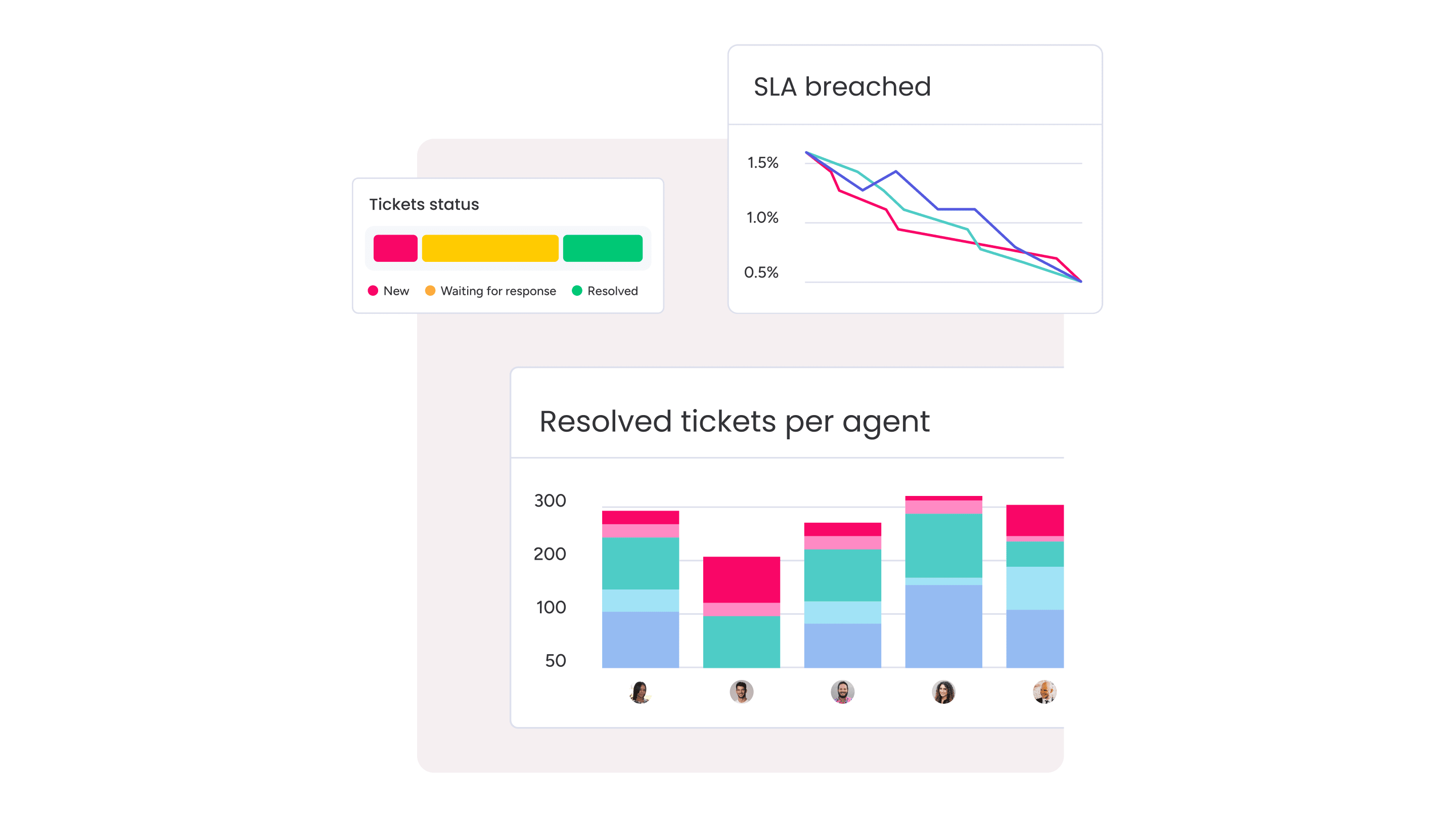
5 examples of how to use AI in service management
AI service management is transformational for many business functions. Here are 5 real-world examples of how AI is being applied to modern service teams.
1. Customer service and support
AI-powered chatbots and virtual assistants take care of the routine stuff, so agents can spend time tackling more complex customer issues. With natural language processing, AI-powered customer service picks up on sentiment, prioritizes urgent requests, and crafts more personalized responses. It also reviews past interactions, giving agents the insights they need to respond more accurately and avoid making customers repeat themselves.
2. Finance and procurement
In finance, things like budget approvals, vendor onboarding, and invoice queries can be time-consuming. AI routes requests to the right people based on past patterns or company policies, cutting down on delays. It also flags duplicate or out-of-policy submissions to reduce errors. Plus, with NLP tools, AI understands and classifies finance-related emails or forms, speeding up the process even more.
3. HR service management
HR teams handle a wide range of internal requests, such as benefits questions and onboarding tasks. AI triages requests submitted through email, chat, or portals and routes them based on employee location, role, or department. Using known employee data, it also populates standard forms or documents, reducing back-and-forth.
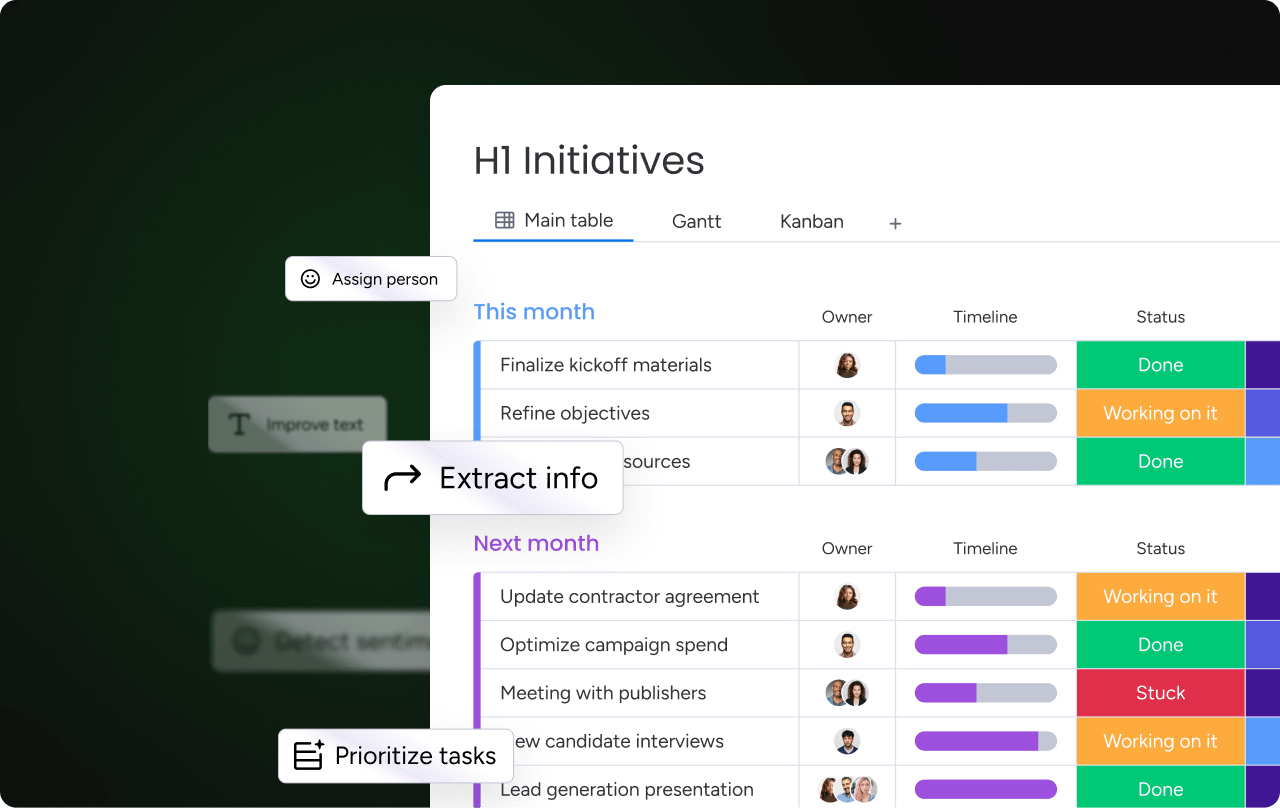
4. Operations management
Instead of reacting to problems as they pop up, AI lets operations teams plan and stay one step ahead of potential disruptions.
It spots trends, like recurring maintenance issues or stock shortages for ops teams to address before they turn into bigger problems. AI also takes care of automating tasks like assigning work or sending updates when certain conditions are met.
5. Marketing operations
Marketing teams often juggle tons of requests for content, campaign approvals, and creative assets. AI lightens the load by sifting through form submissions and directing them to the right people based on urgency, request type, or past activity. Whether ad copy, logos, or social templates, AI prevents these last-minute requests from piling up and slowing marketing campaigns down.
What is AI in IT service management?
While AI enhances service management across a wide range of departments, its impact on IT is especially significant. IT teams are central to service delivery, dealing with high volumes of complex requests, strict SLAs, and constant change. AI gives IT teams the tools to drive real change, reduce friction, and deliver more value across the business. Here’s how that plays out across key IT tasks:
Incident management
Incident management is traditionally a reactive process, but AI uses real-time detection to get one step ahead of any service disruptions. The technology analyzes request data as it arrives, spots early signals of any broader issues, and then puts steps in place for a swift resolution.
Example: A user reports a connectivity issue. AI scans the language of the request, determines that it’s probably a VPN problem, and routes it to the correct network team. As similar issues appear, it connects them to a recent OS update, triggers a major incident alert, and recommends a rollback to avoid a larger outage.
Request management
Request management covers the day-to-day needs of employees, such as software access, hardware, or security permissions. AI brings speed and scalability to this process by validating user context and automating approvals or fulfillment where appropriate.
Example: An employee requests access to Salesforce. AI confirms their department and past access and assigns the request to an appropriate approver to automatically provision the tool. For common tasks like password resets, teams can also offer a full self-service with no IT involvement.
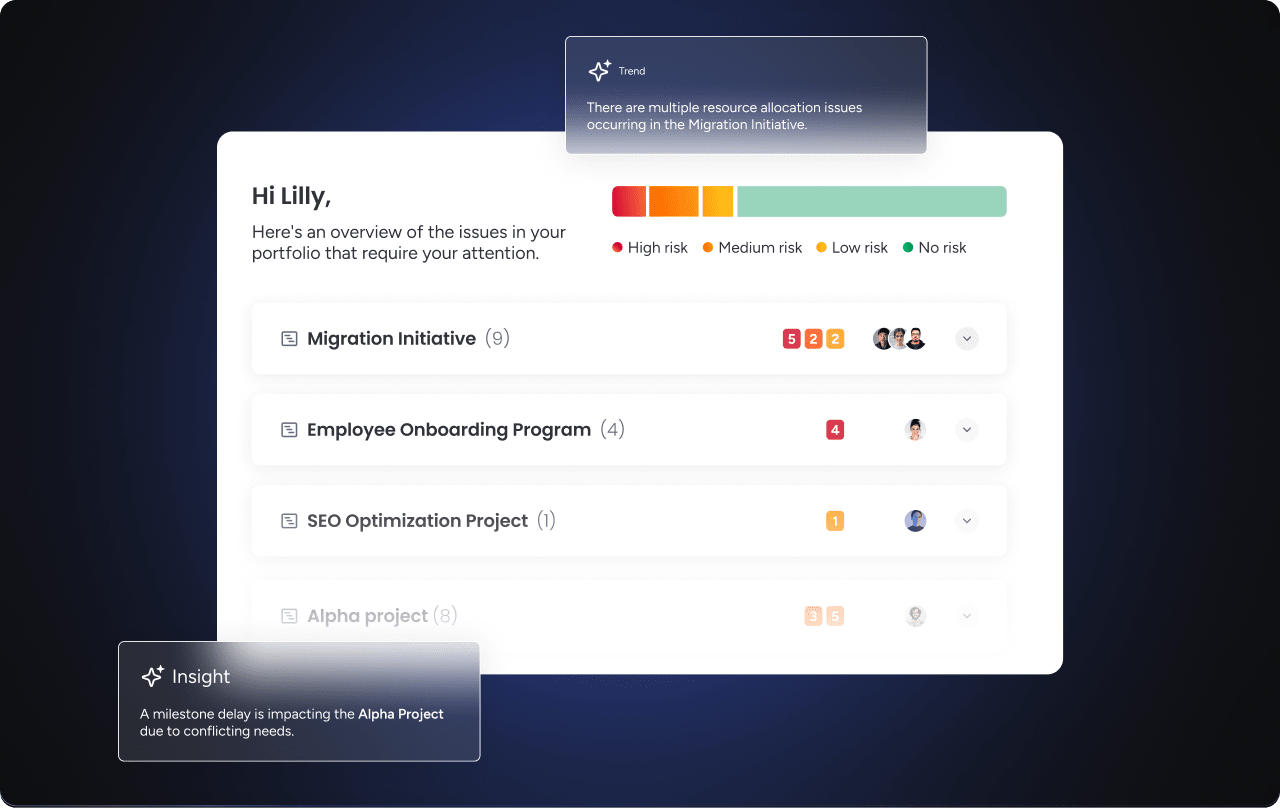
Knowledge management
Effective knowledge management makes the right information available whenever agents or end users require it. AI builds on this by suggesting helpful content during a live case and capturing new knowledge without interrupting workflows.
Example: While working on a ticket, an agent sees an article suggested by AI based on the issue and ticket history. After resolving it, AI uses its notes to draft a new article, making it easy to review and publish without starting from scratch.
Change enablement
Managing any type of change in IT, such as software rollouts or infrastructure updates, requires careful risk assessment and cross-team coordination. AI supports this by drawing on historical data to evaluate proposed changes and offering data-driven guidance to reduce disruption.
Example: Before approving a change request for a new HR system integration, AI reviews similar past changes and flags a risk based on downtime patterns. It recommends a safer rollout window and alerts teams managing related systems like payroll and SSO.
Asset and SLA intelligence
This critical function ensures IT assets are always maintained, and service levels are met. AI identifies early signs of failure and keeps teams ahead of SLA breaches before they happen.
Example: AI tracks usage patterns and error logs for a group of laptops and predicts several will likely fail within 30 days. It also spots two VIP tickets trending toward SLA breach and triggers escalation before missing the deadline.
Resource management and allocation
As service volumes rise and shift, IT leaders depend on AI to maintain balance across teams. Analyzing current workload data and historical trends prevents support staff from becoming overloaded, instead assigning them where they’re most needed.
Example: During a product launch, AI detects the team’s Tier 1 agents are at capacity while Tier 2 agents are underused. The technology recommends rerouting simpler tickets and adjusting after-hours coverage based on agent performance and response time trends.
monday service: Built for the future of AI service management
AI service management empowers service teams to deliver smarter, more scalable support that aligns with broader business goals. But to truly unlock this potential, the right platform is essential — and that’s where monday service comes in. With its intuitive interface, flexible AI workflows, and embedded AI, monday service seamlessly connects people, data, and processes, making it easy to manage complex service operations without losing control or visibility. Here’s what you can expect when adopting monday service:
Drive faster resolutions with AI-powered classification and routing
At the heart of AISM is the ability to streamline the service process. monday service makes light work of incoming requests by automatically classifying them based on type, sentiment, and priority, then assigning them to the right teams in real time. With SLA timers, smart escalations, and integrated surveys, your team maintains full control and transparency without manual triage.
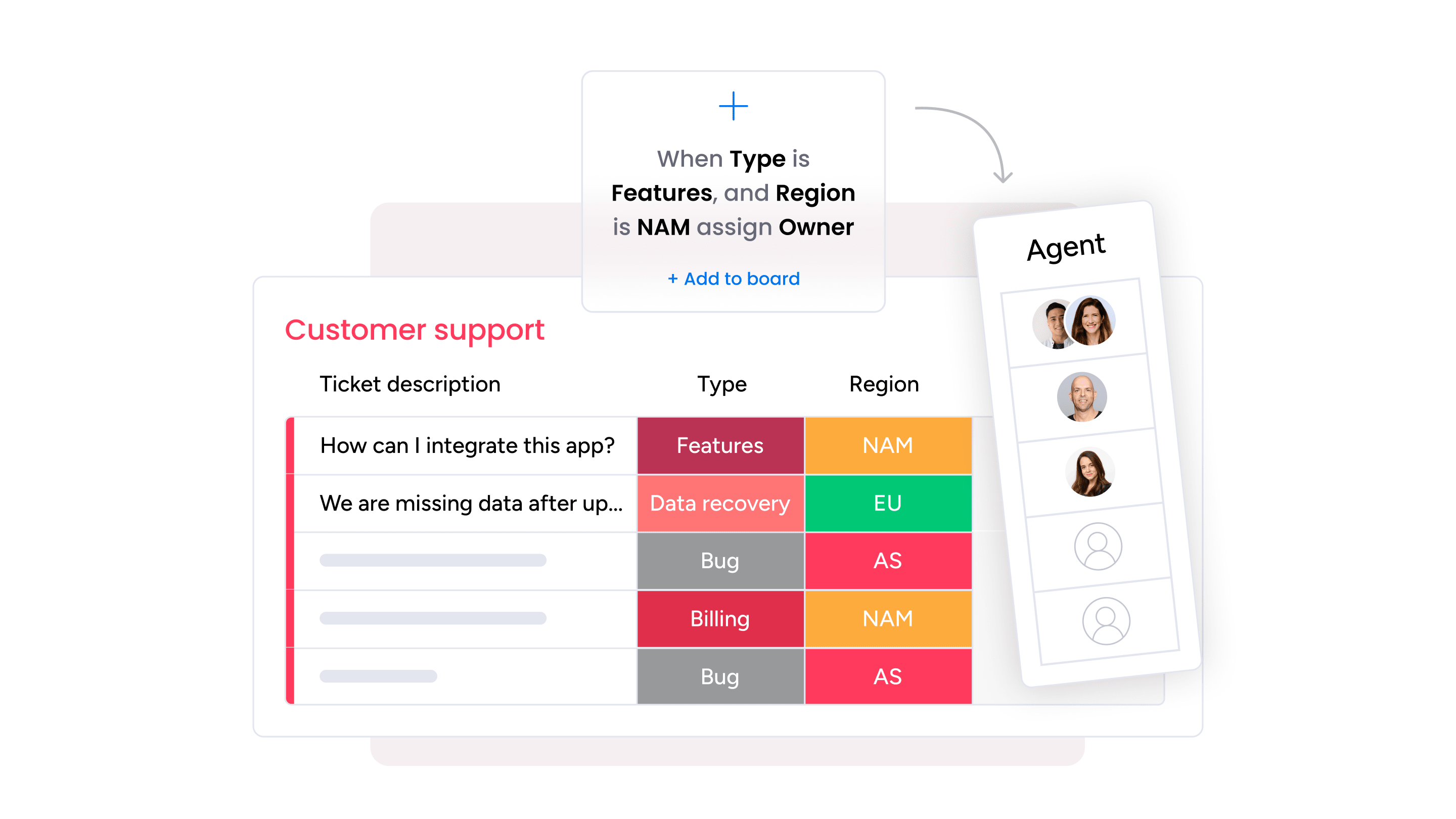
Deliver a consistent, personalized service using AI-enriched context
AISM isn’t just about automation — it’s about relevance to the person requesting support. monday service integrates with tools like CRMs, employee directories, and asset systems to give agents full visibility into the request context. AI-assisted fields auto-fill known information, suggest previous resolutions and keep every interaction fast, accurate, and tailored to the user’s profile.
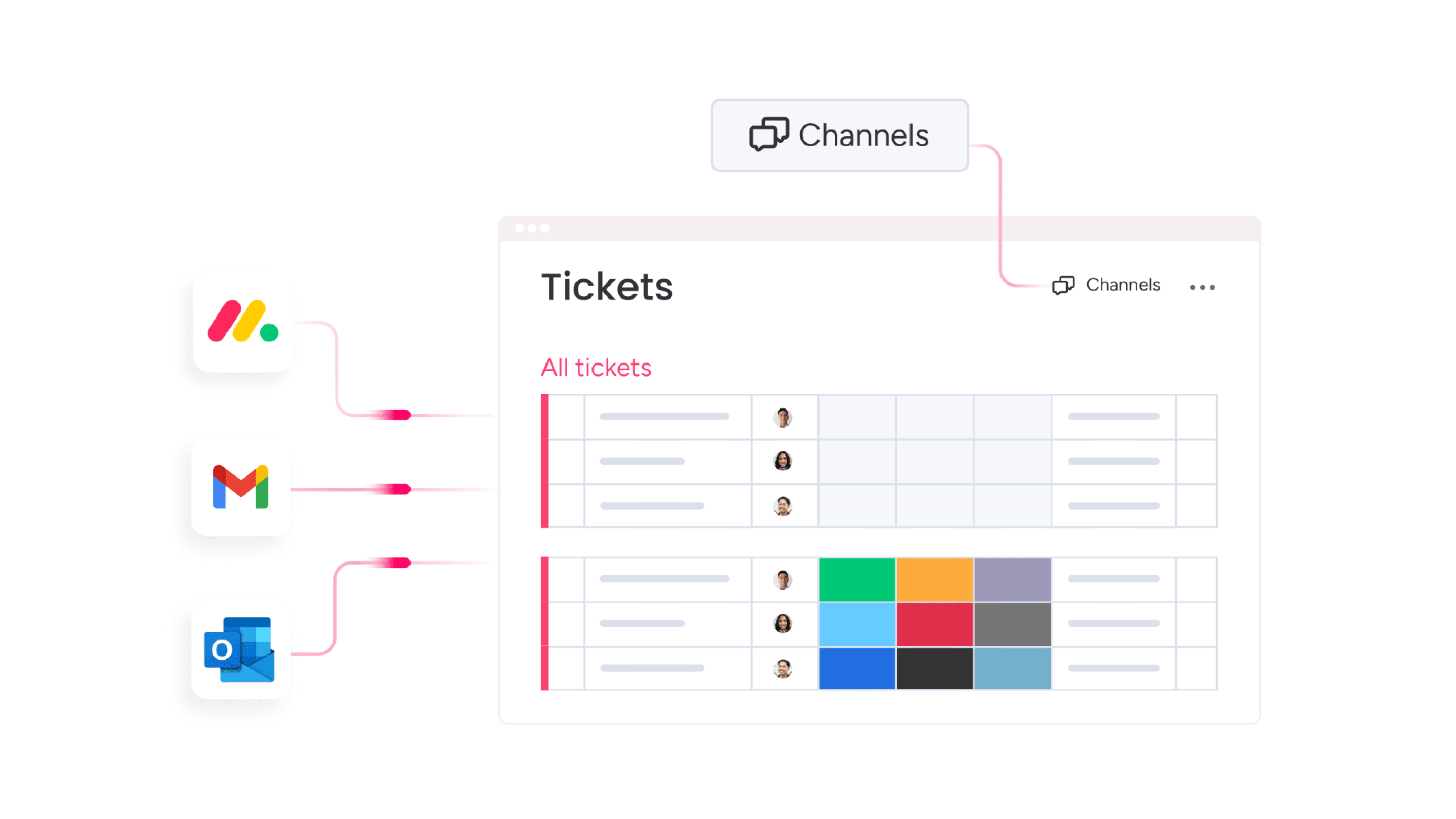
Empower agents with AI assistance in the flow of work
Artificial intelligence augments the human layer of service delivery. With monday’s AI service agent, teams receive real-time suggestions, historical resolutions, and next-step recommendations directly within their workflows. Combined with an AI-curated knowledge base and automated task handoffs, the platform enables agents to resolve complex issues quickly without starting from scratch.
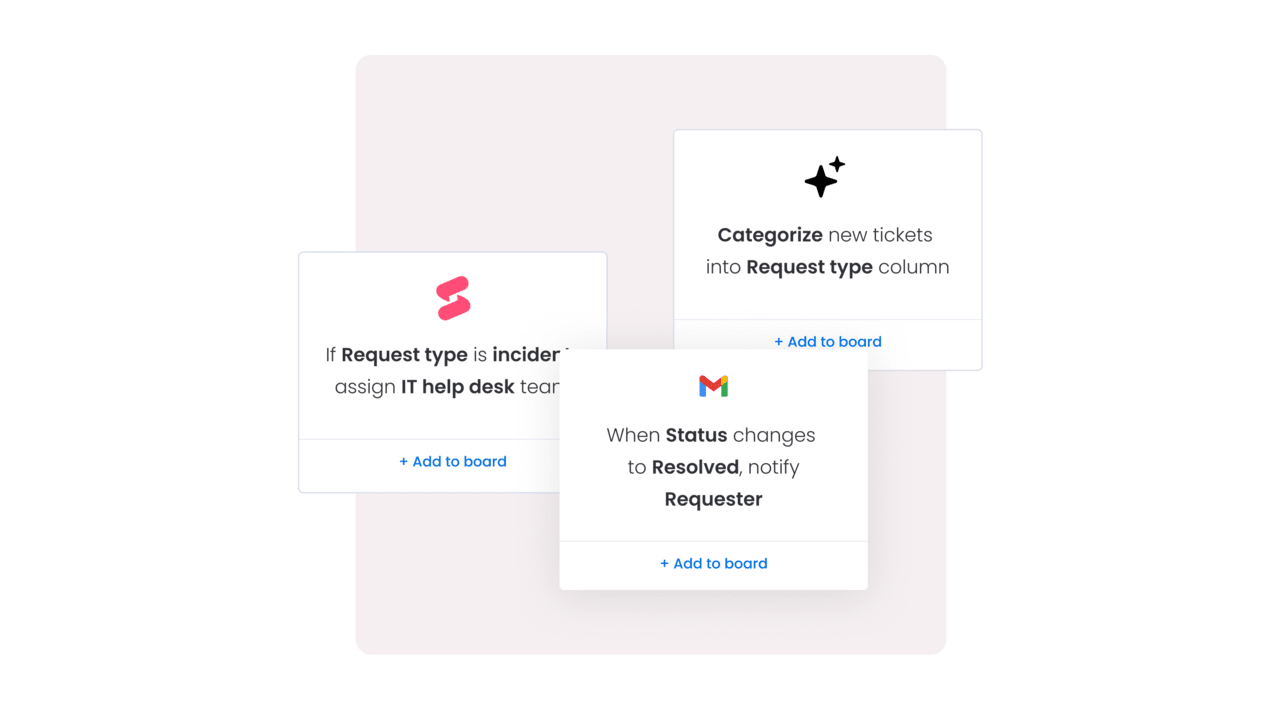
Move from reactive firefighting to proactive service planning
Effective service management is about anticipating what’s next, and monday service provides the foresight. Predictive analytics flag emerging trends, recurring issues, and potential SLA breaches before they escalate. Service leads monitor help desk request patterns and intervene proactively, all aiming to deliver consistent value during periods of change or uncertainty.
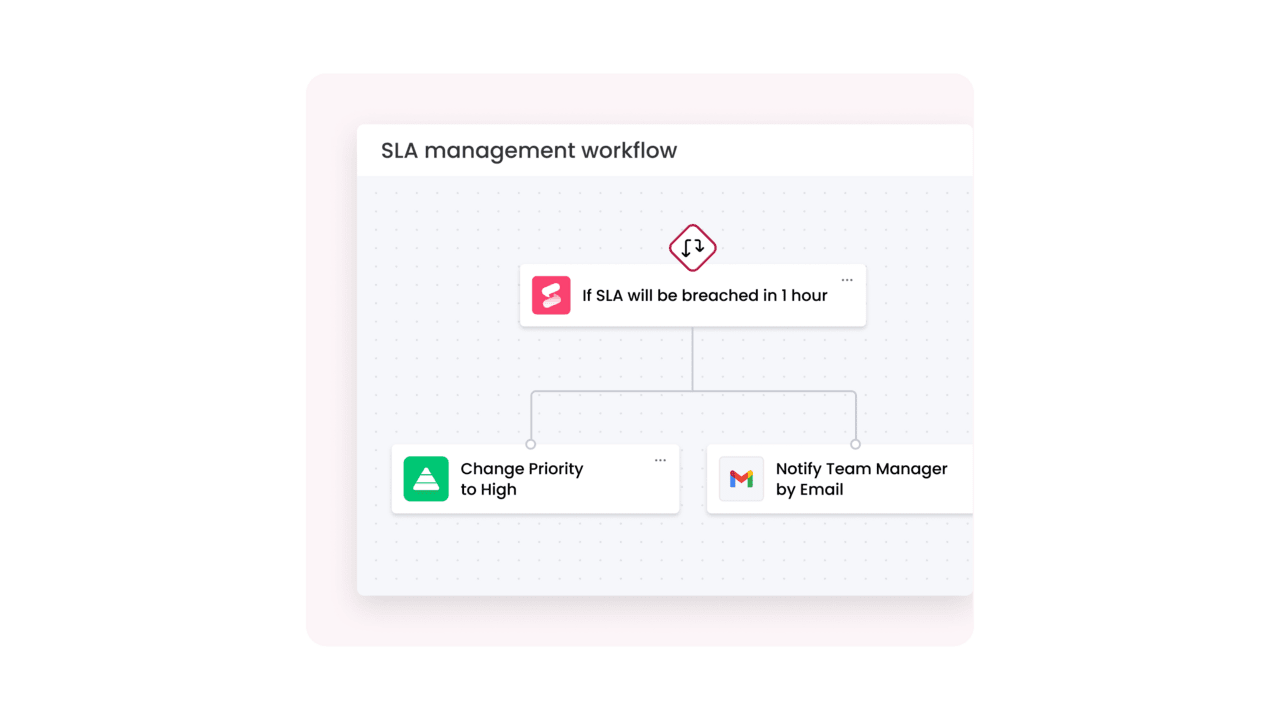
Orchestrate smarter service operations from one connected platform
True AISM relies on seeing the full picture, and monday service brings everything into view. AI ticketing correlates with cross-department initiatives and recommends workflow adjustments on the fly. With visual dashboards, workload balancing, and intelligent automation, your entire service lifecycle becomes easier to manage and refine.
Teams can track performance using a central dashboard customized with your choice of 27+ board views, 36+ column types, and 25+ customizable widgets. With 72+ integrations, the platform also connects seamlessly to the tools you already use, with no coding knowledge required.
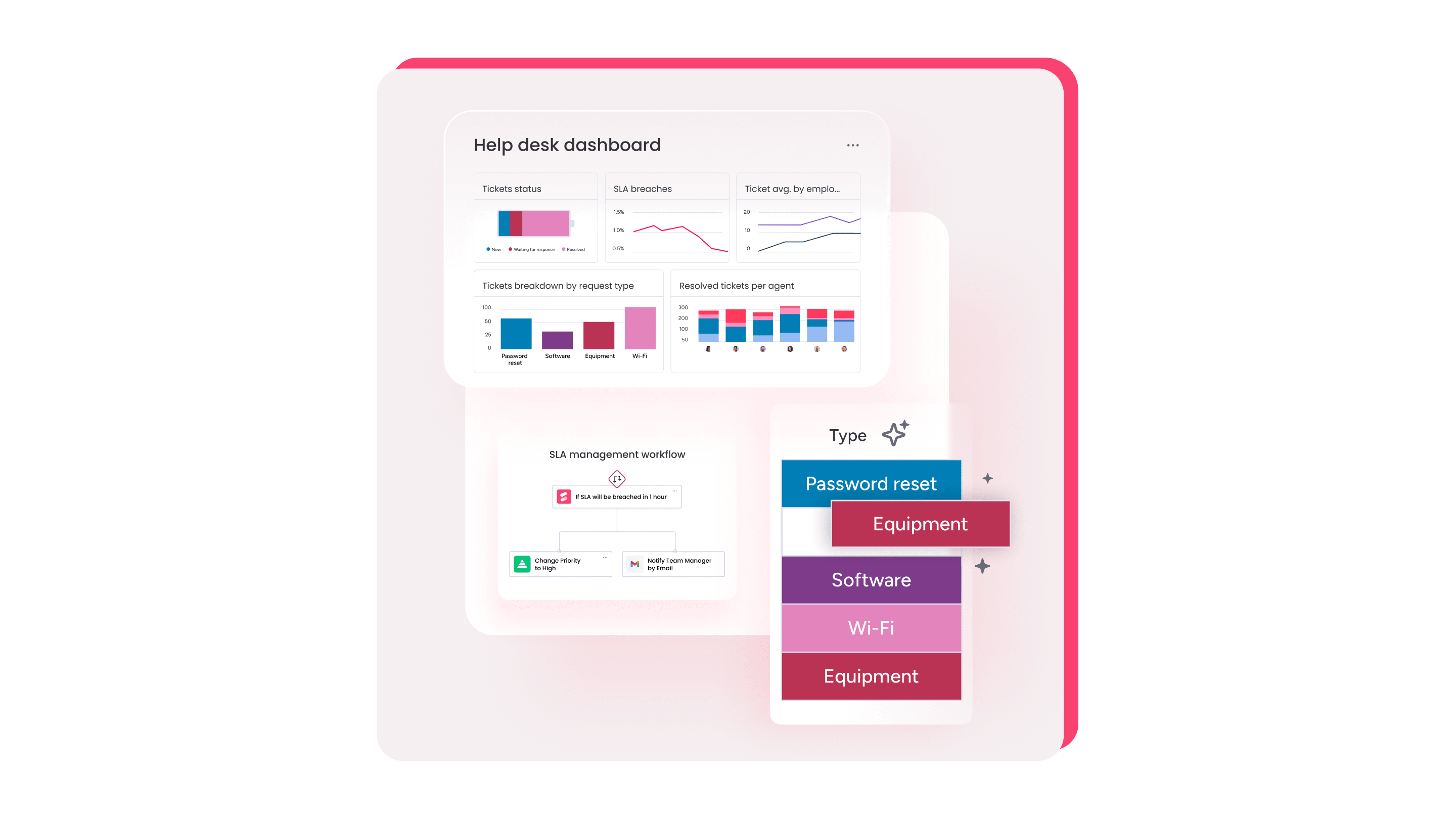
Built for IT leaders, service desk managers, and cross-functional teams, monday service puts the theory of AISM into practice. Try monday service for free to elevate the way your team delivers service.
Try monday serviceFAQs
What are the top 4 AI service management software?
The following 4 AI service management software stand out for their functionality, scalability, and adoption:
- monday service: A flexible, no-code platform with embedded AI for ticket classification, routing, predictive insights, and AI Copilot support.
- Jira Service Management: A developer-friendly platform with AI-driven request routing and integrations across Atlassian’s ecosystem.
- ServiceNow: A scalable enterprise platform with advanced AIOps capabilities and embedded virtual agents.
- Zendesk: A customer-centric support platform with sentiment analysis and automation across multi-channel interactions.
What is a top company in the IT service management sector for generative AI services?
Microsoft is currently leading the field when it comes to enterprise-focused generative AI in service management. With an estimated 39% market share in AI platforms as of 2024, Microsoft's dominance stems from Azure AI’s deep integration with models like OpenAI’s GPT, strong customization capabilities, and support for multimodal AI.
However, since its launch, monday service has emerged as a powerful addition to the AI service management landscape. Built on the monday.com Work OS and available in over 200 countries and territories, monday service offers an innovative combination of intelligent automation, intuitive workflows, and seamless integrations. This new approach gives organizations the tools to streamline service delivery, reduce manual tasks, and make smarter, more informed decisions — all without the usual friction.
How is AI used in service management?
AI enables service management teams to work more efficiently, personalize support, and stay ahead of demand. The technology plays a number of roles in modern service management, including:
- Routing and classification of incoming requests based on content, urgency, and context
- Automation of repetitive tasks like password resets, approvals, or ticket handoffs
- Predictive insights to flag SLA risks or identify ticket surges before they happen
- Generative AI support to suggest replies, draft ticket summaries, or assist agents in real time
- Trend analysis and reporting to continuously improve service delivery
What is an AI management system?
An AI management system refers to the tools and infrastructure used to orchestrate, monitor, and optimize AI-powered processes across a business. In the context of service management, it includes platforms that:
- Handle AI-powered classification, routing, and workflow automation
- Monitor AI performance and ensure compliance
- Integrate with existing tools (like CRMs or ITSM platforms)
- Enable users to refine and scale AI use cases over time
In essence, it’s the system that keeps AI running consistently, securely, and in alignment with business goals.
 Get started
Get started 
